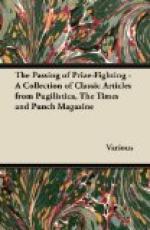He is discreet as he is erudite. An inquiry about meat-imports elicited plenty of information about “ewe-mutton” and “wether-mutton,” but not a word about the Manchurian and other exotic beef recently foisted upon London consumers.
Mr. REMER is one of the most attractive and enterprising of the new Members. But I am afraid, despite his cheery appearance, that he is a bit of a pessimist. With Peace believed to be so near, it was distinctly depressing to find him calling attention to the danger of a deficiency of pit-props “in any future war,” and refusing to be put off with the usual official answer, “in view of the urgency of the question.”
There are few topics which excite more general interest in the House than the shortage of whisky. When, in reply to a complaint by Colonel THORNE that a firm of Scotch distillers had refused to furnish their customers with adequate supplies, Mr. GEORGE ROBERTS remarked that he would like to be supplied with “specific cases,” he was, no doubt unconsciously, expressing an almost universal desire.
Before the War, as we learned from Mr. ILLINGWORTH, Government offices used to send on the average about forty thousand telegrams a month. At the end of it the number had risen to close on a million. Much of the increase is due, no doubt, to zeal for the rapid despatch of public business, but some, one fears, to the natural tendency of dug-outs (even in Whitehall) to protect themselves with wire-entanglements.
If one were to believe all that the Scottish Members said about their own country in the debate upon the Housing (Scotland) Bill Dr. JOHNSON’S gibes would be abundantly justified. Half the population, according to Sir DONALD MACLEAN, are living in such over-crowded conditions that the wonder is that any of the children survive to man’s estate, and still more that they retain sufficient energy to run most of the British Empire. But in the circumstances a certain amount of exaggeration may be forgiven. When it is a case of touching the Imperial Exchequer for local advantage the Scot is no whit behind the Irishman in “making the poor face.”
Tuesday, May 6th.—The Scottish peers are no less impressed with the miserable condition of their country, Lord FORTEVIOT declared that in the Western Hebrides the housing accommodation was no better than the caves of primitive man. Yet these cave-dwellers furnished some of the stoutest recruits to the British army. Perhaps it was their early experience that made them so much at home in the trenches.
Their lordships gave a Second Reading to the Solicitors’ Bill, designed to enable the Incorporated Law Society to punish as well as try offending attorneys, instead of leaving their sentences to be determined by a Divisional Court. The LORD CHANCELLOR and Lord BUCKMASTER were of one mind in thinking that the measure would be enthusiastically welcomed by the lower branch of their profession—presumably on the principle of “Better the devil you know than the devil you don’t know.”




